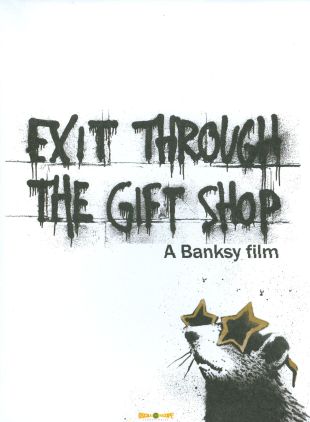
Exit Through the Gift Shop marks the feature-film debut of the subversive street artist Banksy, and it's a movie fully worthy of the artist's scandalous reputation.

Exit tells the fascinating, often hilarious, and finally somewhat disheartening tale of Thierry Guetta, a French-born L.A. thrift-store owner and compulsively self-chronicling videographer who sort of accidentally begins documenting the phenomenon of contemporary street art. Over the course of the movie, we learn how Guetta's footage ended up in Banksy's capable hands, and how Guetta went from being an obsessed (if haphazard) chronicler of the scene to being a successful "street artist" himself. Exit is also about how Banksy and Guetta started out as subject and documentarian and ended up with their positions reversed.
"He turned out to be a lot more interesting than me," explains Banksy, the mysterious filmmaker, photographed in shadow with his voice disguised, at the beginning of the documentary. While it's true that Guetta is a compelling subject, it's also true that he craves the celebrity that Banksy shuns.
The movie makes it clear why many street artists (including Shepard Fairey and Space Invader) were happy to have Guetta tag along and videotape them as they illegally disseminated their work. For one thing, the nature of their work is ephemeral, and a video document offered the chance of some kind of preservation for posterity. Guetta himself is as fearless as the artists, helping them move equipment and keeping an eye out for the authorities. In one of the more nerve-wracking sequences, Guetta is busted at Disneyland while taping one of Banksy's more politically inflammatory installations. The park was essentially shut down, and Guetta was questioned for several hours.
Guetta earns Banksy's trust, but their relationship sours when Banksy finally sees what Guetta has done with all his footage. This leads to Guetta beginning his new career as a street artist, under the name of "Mr. Brainwash."
Exit is a wonderfully rich, absorbing, and fun documentary. It embodies the subversive energy of the scene it documents, capturing both the playfulness and the underlying critique imbedded in the work of Banksy and his fellow artists. It's also a fascinating portrait of a unique 21st century eccentric. But perhaps the movie is most compelling where these two elements clash, and a freewheeling document of an unpredictable and rebellious underground culture becomes a movie about that culture's predictable and depressing (if ruefully amusing) commercial co-optation. It examines the commoditization of art through a specific form -- subversive illegal street art -- that initially would appear to be uniquely resistant to commoditization.
Because of Banksy's reputation as a prankster, some have suggested that Thierry Guetta (and by extension "Mr. Brainwash") is a fictional creation of Banksy. Banksy has denied the allegation, of course, and after seeing Banksy's work (and the amazing documentary he's made), one suspects that if he was directly responsible for Guetta's work, the art of "Mr. Brainwash" would be a lot more interesting.
